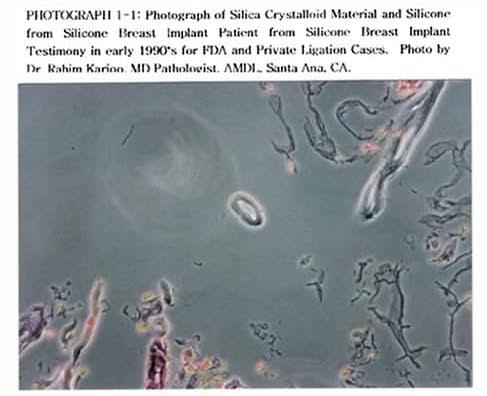- FAR-INFRARED RADIANT HEAT (FIR RH) TYPE REMEDIATON for
MOLD and OTHER UNIQUE DISEASES ©
-
- Paper presented by Dr. Hildegarde Staninger, RIET-1,
Industrial Toxicologist/IH & Doctor of Integrative Medicine. Integrative
Health International, LLC, 12235 E. Centralia St. Lakewood, CA 90715 Tel:
562-402-7300 Fax: 562-402-7308
-
- October 18, 2006, NREP Annual Conference (http://www.nrep.org) in
Nashville, TN; National Registry of Environmental Professionals, Glenview,
IL 60025 (Full text with references at link below.)
-
- EXCERPTED FROM ABOVE PRESENTATION (p. 3) :
-
- FDA, EPA and Nanotechnology
-
- Nanotechnlogy is the ability to control things at an
atomic and molecular scale of between one and 100 nanometers and has been
met with enthusiasm across a variety of industries. Critics highlight the
murky area of how nanoparticles affect toxicity and say nanoparticles should
be treated as new, potentially harmful materials and tested for safety
accordingly.5
-
- Unlike pharmaceuticals, which must go through a series
of pre-market approvals, finished dietary supplements need no pre-market
approval. Under the Dietary Supplement Health and Education Act (DSHEA),
which is part of the Food and Cosmetic Act, only ingredients not marketed
in the US before October 1994 must be approved by FDA before use in consumer
products. Thus, as it stands, pre-market regulation of nanotechnology in
dietary supplements, biological pesticides, and other man made nanotechnology
does not fall under FDA, EPA, OSHA, FIFRA and other regulatory agencies
in the USA, just for the simple reason that the nanotechnology is so small
that the conventional regulatory laboratory methods do not have equipment
to measure at 9 decimals below the zero and are only addressing 3 and 4
decimals (ppm, ppb, and ppt).
-
- In 2005, the Woodrow Wilson International Center stated
that more than $30 billion in manufactured goods, according to Lux Research,
almost doubled the previous year. The market analyst projects that by 2014,
15 % of all globally manufactured goods will incorporate nanotechnology.
So, as environmentalists, engineers and scientists, how do we monitor and
keep our bodies, workplace and environment safe from its own self?6 (p.
3)
-
- ===========================
-
- (p. 7, ibid)
-
- Some other diseases that have come into play for workplace
and environmental exposures are the following:
-
- Morgellons - A disease in which individuals
have the growth of fibers from their skin that burn at 1,700 degrees F
and do not melt.20 A private study to determine the chemical and biological
composition of these fibers has shown that the fibers' outer casing is
made up of high density polyethylene fiber (HDPE). The fiber material is
used commonly in the manufacture of fiber optics. There is no history
of the individual in that industry or coming into contact with this material.
It was further determined that this material is used throughout the bio
nanotechnology world as a compound to encapsulate a viral protein envelope,
which is composed of a viron (1/150th times smaller than a virus) with
DNA, RNA, RNAi (mutated RNA) or RNAsi linear or ring plasmids for specific
functions.21, 22 (Note: Full Laboratory results will be available when
this study, now in process, is completed.)
-
- Toxicological pathology identification of tissue biopsies
from an individual diagnosed with Morgellons revealed the presence of continual
silica or glass tubules with the presence of silicone.23 It must be noted
that the core toxicological effects of silicone alone have been demonstrated
throughout the breast implant industry and litigation cases.24, 25 Furthermore,
silicone cannot make silica, but silica or silica bicarbonate can make
silicone through natural cellular interaction in a biological system. The
subject did not have breast implants or any other implant or silicon glue
injections.
-
- FAT CELLS WITH RIVERS OF SILICONE ( from Pathology Report
Knee Tissue from patient )
-

-
-
- SILICA CRYSTALLOID MATERIAL & SILICONE (from Pathology
Report - Knee)
-
-

-
-
- SILICA CRYSTALLOID MATERIAL & SILICONE FROM SILICONE
BREAST IMPLANT PATIENT - (from Silicone Breast Implant Testimony)
-
-

-
-
- (p. 8, ibid)
-
- Conclusion
-
- The last 30 years of the birth of OSHA and EPA has given
us 3 decades of professionals in the field of environmental health and
science. All of us have been dedicated to reducing the risk of exposure
to hazardous materials in the workplace, environment and home. We came
from a generation of creating a Material Safety Data Sheet (MSDS) and telling
the world of industry that it must comply but little did we know that mankind
was on its own mission of creating nanotechnology that would never be ruled
by an MSDS or hazardous material incident report. It would go as a silent
plague into the DNA of every living creature on this planet to reveal its
true face in the generations to come. Or, will it be one that never shows
its face because the world may become infertile due to its own demise?
-
- ===============================
-
- Full Paper at:
- Findings
Presented by Dr. Hildegarde Staninger - Oct. 18th-2006
-
- FULL SET OF PHOTOGRAPHS OF SLIDES FROM KNEE PATIENT BONE
AND TISSUE with INDEX:
- INSERT NO. 4 - FULL SET OF SLIDES W/INDEX
|
